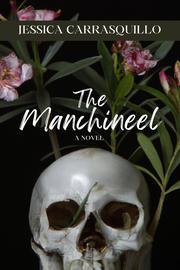Elyse Santiago is a beautiful young woman with a traumatic past. Having killed the man who sexually abused her by feeding him toxic sap from the manchineel plant when she was 12 years old, Elyse now shares her ongoing fascination with all things botanical with her devoted base of Instagram followers. Her best friend, Stella, whose abusive husband died of a heart attack and left her a wealthy widow, throws a house party and introduces her to Ben Deluca, a talent acquisition lawyer who sees showbiz stardom in Elyse’s future. The spark between them is immediate and undeniable, but there’s one thing standing in the way of a future together: Ana, Ben’s cruel wife. Ana’s wealthy father (who may remind readers of predatory movie exec Harvey Weinstein) also happens to be Ben’s boss; he finances the lavish lifestyle to which the unhappy couple have become accustomed. Every time Ben tries to leave their marriage for good, Ana threatens to ruin his life—or the lives of those he cares about. When Elyse decides to take matters into her own hands, she embraces her inner nature: “Nature is brutal, isn’t it? It’s impolite. It takes what it wants, and it doesn’t ask permission. Given the option to shrink or thrive, it will choose to thrive no matter the cost.” At first, everything seems to be going according to plan—Ben is made partner at his law firm, and Elyse wraps up loose ends from her past—until one major hiccup occurs that could derail the new life that Elyse is attempting to set up for herself and Ben.
Heavy-handed symbolism (present from the very first line) drives home the connection between Elyse and her beloved killer plants: “See this beauty? It may seem innocent, but this invasive species is a killer.” Whatever sympathy Elyse garners from her horrific childhood experiences with both sexual and physical abuse quickly evaporates when it becomes clear that her first instinct when faced with any sort of inconvenience is murder. Smooth dialogue and a brisk pace keep the action moving along nicely—there are many twists and turns packed into the narrative. The depictions of spousal physical abuse are quite graphic, and there is a trigger warning included at the beginning of the book. Carrasquillo’s choice to reverse the typical abusive gender dynamics within Ben’s marriage is a clever one that sheds light on an often ignored problem. Unfortunately, Ana tends to come across as more of a cartoon villain than a fully fleshed out person: “You don’t know what it means to have your life ruined yet. I haven’t even gotten started,” she heckles him from the edge of the bed. “You will pray for the piece of shit life you had before you met me.” Ben, meanwhile, bumbles along, trying to do the right thing…until he doesn’t. There is never much of a sense of “true love” between the lawyer and the murderer. Instead, readers are simply left with a sense that Ben better not upset Elyse—or she’s likely to resort to her favorite solution.

